Iran Imposes Sweeping Ban On Afghan Nationals' Entry
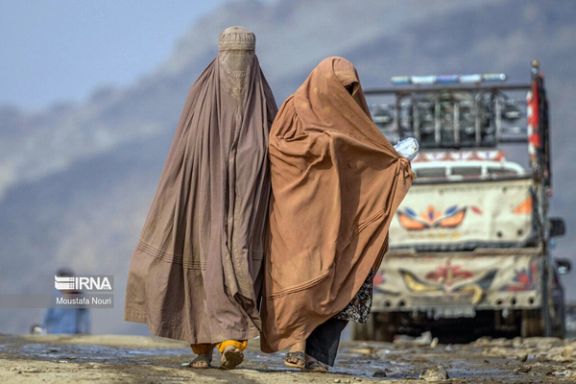
Iran has declared a comprehensive ban on the entry of Afghan nationals into 16 provinces across the country.

Iran has declared a comprehensive ban on the entry of Afghan nationals into 16 provinces across the country.
The Director General of Citizenship and Foreign Nationals Affairs of Kermanshah Province, Hamzeh Soleimani, confirmed on Sunday that settlement and employment of Afghan citizens are currently prohibited in provinces including Kermanshah, under a newly issued directive.
The directive, comprising eight stages for the identification, detention, and deportation of unauthorized nationals in Kermanshah, has been underway since the start of the year (March 21).
“Numerous housing construction projects, greenhouses, horse stables, and livestock farms underwent inspection under the plan, leading to the arrest and expulsion of Afghan workers from the province,” noted Soleimani.
The official also reported the detention of employers who had hired the individuals, emphasizing the severity of the measures taken.
Although specific provinces were not mentioned in the announcement, the Farda-e-Eghtesad website disclosed a list of 15 provinces where the residence of Afghan citizens is now prohibited. These include East Azarbaijan, West Azarbaijan, Ardabil, Zanjan, and others.
Simultaneously, Ahmad Vahidi, the Minister of Interior in Ebrahim Raisi's administration, revealed the expulsion of approximately 400,000 migrants living “illegally” in Iran. However, details regarding their nationality and the timeframe for their return to their home countries were not provided.
The development follows over 540 artists, lawyers, doctors, journalists, and activists demanding an end to harassment against Afghan migrants in Iran in October. Amnesty International has also warned of the serious risks, particularly for Afghan women and girls, exposed to harassment and abuse solely based on their gender.
Afghan refugees have been streaming through the border in recent years, with their total number now estimated to be between six to seven million, according to the Iranian Parliament’s Research Center expert.

A known Islamic extremist praising Islamic State has been arrested in France after an attack which killed one German tourist and injured two others in an attack "to avenge Muslims".
The victim was believed to be a 23-year-old German-Filipino citizen according to France 24. A 66-year-old British citizen and a 60-year-old French national were also wounded and the suspect, only named as Armand R, is now being investigated "in connection with a terrorist plot".
Born in France to Iranian parents, Armand R, 26, was known for his radical Islamism and had psychiatric issues. The Paris prosecutor's office confirmed he was apprehended and tasered after fleeing the scene of the crime across the Seine.
Interior Minister Gerald Darmanin admitted that Armand R. had previously received a four-year prison sentence in 2016 for planning an attack that he did not execute.
Darmanin claimed that Armand R told the police that he could not tolerate the killing of Muslims in "Afghanistan and Palestine", blaming France for being an accomplice for the Israeli retaliatory attacks in Gaza following the Hamas invasion on October 7, which left 1,200 mostly civilians dead and 240 taken hostage. Israel's onslaught has since left more than 15,000 dead in Gaza and large swathes of the population displaced.
According to France 24, police and security sources claimed the attacker posted a video claiming responsibility to social media at the moment of the attack, speaking about "current events, the government, the murder of innocent Muslims".
In the nearly two-minute video, the attacker declared his support for Islamic State (IS) and pledged allegiance to its current leader Abu Hafs. The attacker claimed he acted “to avenge Muslims” and hailed the accomplishments of IS members. According to the report, he made no mention of Palestine or Gaza in the video.

The surge in Black Friday sales for businesses operating on Instagram in Iran indicates the ongoing popularity of the platform despite a government ban.
Podro, a social commerce and logistics company that provides various services to small and medium-sized businesses, claims Instagram-based businesses’ sales went up by 38 percent in value on Black Friday with some small businesses selling up to 20 times more than in normal days. However, no actual sales numbers are available.
Podro’s claims are based on the results of an Instagram Black Friday campaign it launched in which around 2,000 small and medium-sized businesses took part.
Black Friday sales have become popular in Iran in the past few years. Fashion and beauty products made up most of the commodities on sale this year, but even homemade jam and condiments were on offer.
Iranians can only access Instagram and other major social media and instant messaging platforms such as X, Facebook, WhatsApp, and Telegram if they have installed anti-filtering software on their devices. They need to circumvent government filters that make these apps inaccessible in the country.
The ban on Instagram, the only social platform not blocked by authorities, was announced on September 21, 2022, a few days after anti-government protests sparked by the death of 22-year-old Mahsa Amini in the custody of morality police engulfed the country.
Instagram is the second most popular social platform in Iran after Telegram with over forty million users. Both platforms are used by millions of small and home-based businesses for marketing.
The ban, and frequent internet blackouts, were meant to prevent protesters from sharing news and footage of the crackdowns. The use of VPNs to help access to banned social platforms and websites, however, surged by 30-fold in the following months.
According to Pashotan Pourpezeshk, the chief executive of Podro, small and medium-sized businesses that use social media as their main marketing tool have the largest share in the country’s online retail market.
A recent report by the e-commerce center of the ministry of industries showed Instagram to be the most used social platform in e-commerce with 55 percent of these businesses relying on it, followed by Telegram (41 percent) and WhatsApp (37 [percent).
Experts have repeatedly warned that filtering Instagram and other social and messaging platforms could be hugely detrimental to small businesses, particularly those run from homes by women or small farms in rural areas, which very heavily rely on Instagram for advertising and WhatsApp for communication with potential customers.
Instagram was instrumental in the exponential growth of small, often home-based businesses that sprang up during the COVID pandemic. Women in many rural areas began selling everything from herbs and vegetables they grew in their rural gardens to duck eggs, and handicrafts through Instagram.
Some of these tiny businesses grew to the extent that they provided work for others. In one fishing village in the southern Bushehr Province, for instance, a fisherman’s young wife started marketing their catch on Instagram a few years ago.
She would clean fish and shrimps caught in the Persian Gulf and send it to customers in nearby cities. The whole village’s catch is now being sold by the business, called Mahimarket (Fish Market).
The catch of the day is packed in ice in polystyrene boxes and sent by airplane to Tehran, over a thousand kilometers away, and other cities, where they are delivered to customers, often individual households, on the same day.
Villagers are also selling other products such as dates, dried herbs, and home-blended spices through the same platform.
Communications minister Issa Zare’pour said last month that forty million Iranians now use domestic social media platforms the number of users of some of which, he claimed, has increased by eight-fold in the past eighteen.
However, there is still a huge demand for anti-filtering software. Yekta Net, a major Iranian online marketing company, said in its latest annual report that 80 percent of Iranians use VPNs to circumvent filtering and access banned social media and messaging platforms. Many Iranians have several anti-filtering software and VPNs on their electronic devices to ensure easier access to banned platforms and websites if authorities manage to disable one or more.
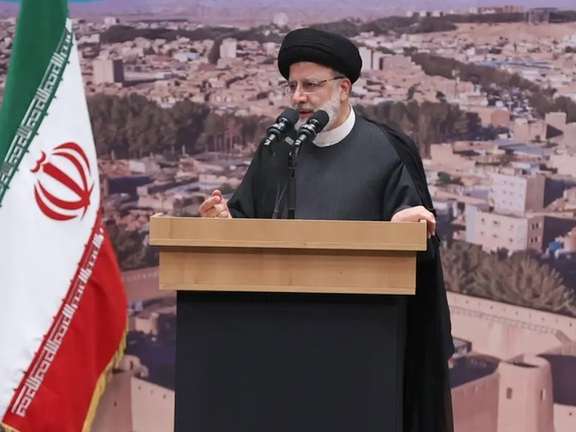
Deflecting accusations of gross violations of Iran's constitution against its people, President Ebrahim Raisi has stressed the country's constitutional commitment to Gaza.
Speaking at the 'Responsibility of Implementing the Constitution' conference on Sunday, Raisi stated that “supporting the oppressed is a fundamental duty outlined in the constitution", defending Gaza a tool to undermine its archenemy, Israel. Amidst the war in Gaza, triggered by Iran-backed Hamas's invasion of Israel on October 7, killing 1,200 mostly civilians and taking 240 more hostage, the regime's focus on Gaza has irked many who say it has abandoned its own people.
In September, lawmakers affiliated with the ultra-hardliner Paydari Party ratified the "Protection of Family Through Promotion of Hijab and Chastity Culture" bill as crackdowns on the mandatory hijab worsens. The legislation proposes penalties, including substantial fines, for women who do not adhere to the compulsory dress code, a policy that sparked nationwide protests.
During the protests following the death in morality police custody of Mahsa Amini, Iranians en mass have rejected the regime's hijab policy, which many argue is not in line with the constitution.
Raisi's reliance on the constitution contrasts with the backdrop of over 500 deaths caused by regime agents during the protests, along with thousands being arrested and tortured without access to a fair trial or legal representation.
The right to protest is recognized in Article 27 of the Iranian Constitution but various Iranian governments in the past four decades have refused to uphold this right and respect the Constitutional Law.
The human rights situation in Iran continues to raise concerns across various domains, continually violating the constitutional safeguards, as has been highlighted by international human rights organizations, including Amnesty International and Human Rights Watch. Key areas of concern include freedom of expression, political repression, religious freedom, capital punishment, treatment of minorities, arbitrary detention, and LGBTQ+ rights.
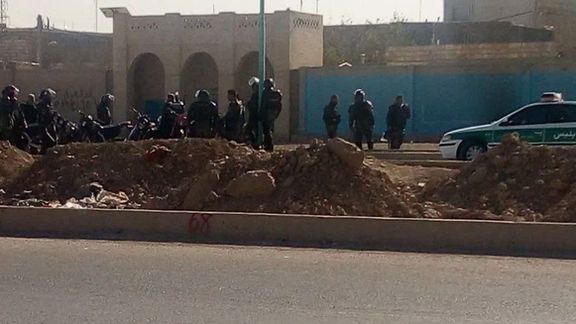
Iranians in Meybod took to the streets on Friday demanding the expulsion of illegal Afghans after a conflict between two groups led to the death of a young Iranian man.
The murder, believed to have been committed by an Afghan national, led to calls on the authorities to remove the Afghans residing illegally in the city. According to reports, among the 90,000 population of Meybod, approximately 12,000 are Afghan nationals.
The commander of the Yazd police, Abbasali Bahdani Fard, claims a suspect has been arrested, less than 15 hours after the street brawl on Friday.
Local sources have identified the victim as Amir-Reza Aghaei with another Iranian hospitalized.
Ali Akbar Azizi, the deputy governor of Yazd, informed IRNA state news agency that some Meybod residents demanded the arrest and punishment of the murderer during Friday prayers.
Social media videos, allegedly related to the Friday prayers in Meybod, depict visible public anger and protests. Some reports suggest that protesters targeted the Friday prayers Imam, the governor, and the commander of the city's IRGC during the demonstrations.
Increased security measures and the deployment of special forces in Meybod on Friday were also reported, with videos circulating on social media capturing the scenes.
Iran international cannot independently verify the accuracy of the videos.
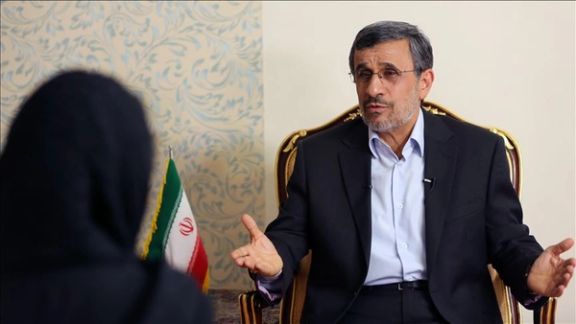
Iran's hardliners have recently made comments against former President Mahmoud Ahmadinejad, seemingly aiming to tarnish his image.
While Ahmadinejad faced considerable criticism for his populist policies during his presidency from 2005 to 2013, he stands out as one of the few politicians in the Islamic Republic who maintained popularity with a segment of the population during his provincial visits after leaving office.
Abdolreza Davari, one of Ahmadinejad's top aides during his presidency, recently said that "Ahmadinejad is under the illusion that the Islamic Republic is going to collapse." Davari claimed that Ahmadinejad’s apparent differences with the regime stem from the fact that he has been ostracized. He added that "After Supreme Leader Ali Khamenei cautioned him not to run for the 2017 Presidential elections, Ahmadinejad realized that he can no longer return to power."
At the time, Ahmadinejad had said that if Khamenei was against his decision to run for the presidency, he would have said it with a loudspeaker [meaning during a broadcast]. Khamenei made his opposition to Ahmadinejad’s presidential run public during a meeting with other politicians and added that "Well, this has been now said on a loudspeaker!"
Speaking about Ahmadinejad's silence about the Gaza war, Davari said "Ahmadinejad has now realized that he cannot return to power as long as the current regime and political structure are in place in Iran,” implying that the former president had no reason to support Tehran’s position in the Gaza war.
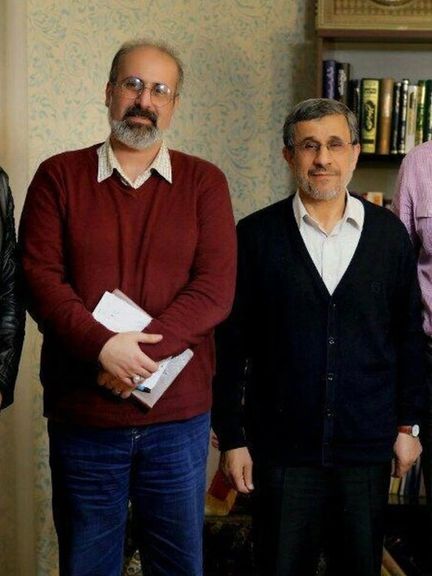
He pointed out that except Ahmadinejad all political factions and politicians including former reformist President Mohammad Khatami have voiced support for Hamas and condemned Israel. They all echoed Khamenei’s position while perhaps Ahmadinejad had a different opinion.
He further accused Ahmadinejad of believing that "the Islamic Republic cannot survive, and he can be the regime's alternative when it collapses."
Meanwhile, In a video that surfaced on social media, vigilante leader Hossein Allahkaram said that because of Ahmadinejad's poor performance during his presidency Iran nearly lost Syria as the "Resistance's most important base” in the region. Resistance is the Islamic Republic's jargon for anti-US forces in Iran, Syria, Iraq, Lebanon and Yemen.
Another close aide of Ahmadinejad, Mehdi Kalhor, also made negative comments to Asr Iran news website about Ahmadinejad’s populism and how his aides fanned his ambitions.
Kalhor accused Ahmadinejad of disclosing family information about his opponent, Mir Hossein Mousavi in the 2009 presidential campaign. Kolhar alleged that Ahmadinejad was privy to Mousavi’s family life because of his close ties with him and his family. Mousavi was one of Ahmadinejad's teachers when he was a student. Later they became family friends. He even admitted during the televised debate that he was one of Mousavi's students.
Kolhar admitted, however, that what Ahmadinejad disclosed about Mousavi and his wife was insignificant and only showed that Ahmadinejad was an opportunist who would use information about a friend for political gain.
Other politicians and media, noted that some of Ahmadinejad's former allies are now working with hardliner Paydari Party Leader Sadeq Mahsouli and Parviz Fattah, another powerful politician close to Khamenei’s office. Mahsouli and Fattah were Ahmadinejad's aids and cabinet ministers during his presidency.
Recently, conservative heavyweight Mohammad Reza Bahonar who is a candidate for the March parliamentary elections had said that Ahmadinejad is planning to present a list of candidates. The mudslinging against Ahmadinejad by conservatives, who are likely to be the only players in the election, could be an attempt to tarnish his image among those who are likely to vote for the candidates he nominates.